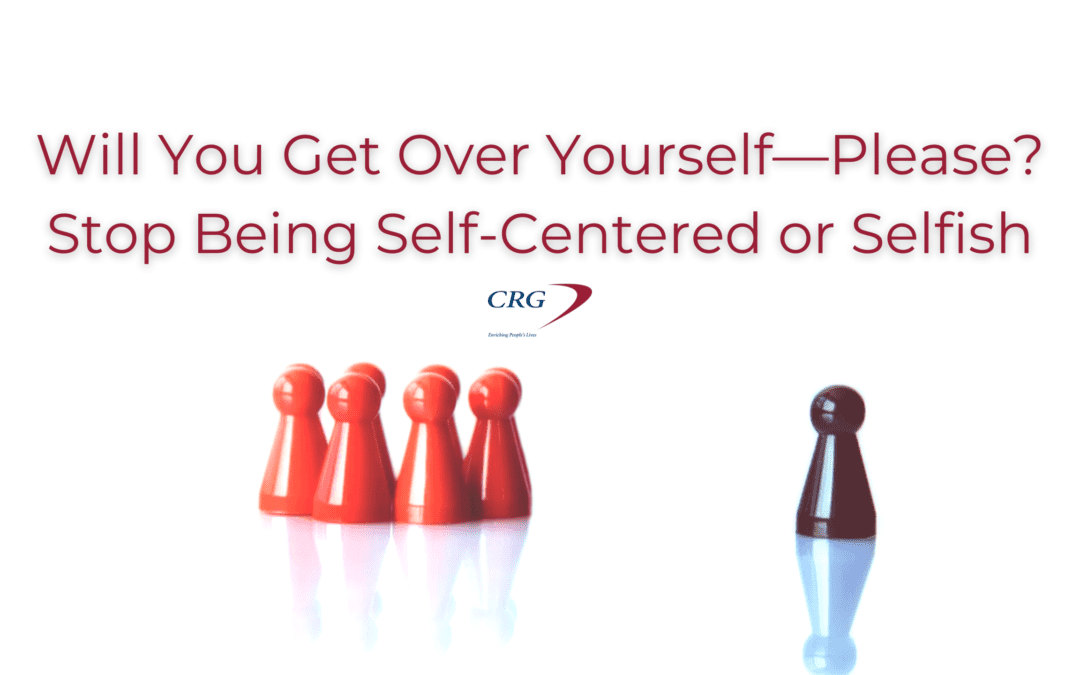Will You Get Over Yourself—Please?
Stop Being Self-Centered or Selfish
Selfish:
Concerned excessively or exclusively with oneself; seeking or concentrating on one’s advantage, pleasure, or well-being without regard for others; arising from concern with one’s welfare or advantage in disregard of others; solely concerned with oneself; easily offended or upset over others’ actions
Have you ever attended a function where the only thing some people want to talk about is themselves? When that occurs, you usually look for an exit strategy as quickly as possible.
Why is self-centered/selfish behavior so unattractive—even offensive?
That character trait is repelling because it means the rest of us are not needed. After all, if a person is talking only about himself, our presence is not required.
Other words that mean the same thing are narcissistic, egocentric, drama-queen/king, self-absorbed or easily offended.
Admittedly, we all have been selfish. We naturally tend to get wrapped up in our own little worlds but, if we choose to do so, we can free ourselves from that tendency, to a large degree. The key is to learn from our past behavior and use that understanding to make our impact more positive in the future.
I recently had the privilege of taking a friend to lunch. I had promised him months ago, but apparently, I was too wrapped up in my own stuff to get away. Sound familiar? My friend—a very successful businessman, now retired—has given freely of his time and wisdom to many, including myself.
In the past, I had called him when I needed something from him. Perhaps because of my increased maturity, this time I focused on him. The sole purpose of this lunch was to thank him for all the wisdom he had shared with me.
The lunch turned out to be very special; I got far more than I gave. I cannot put into words the joy I felt from encouraging this mentor of mine. And my friend was thankful for the visit. Isn’t that just like unselfish individuals!? They have a grateful heart!
It is far better to give than to receive is certainly true.
Now on a totally different track, I want to suggest those who are easily offended, worried about what others think of them are equally self-centered but on the opposite end of this continuum. Usually this is not discussed when thinking about self-centeredness. If it is like walking on egg shells around you – does this not mean this is all about you and what you want (self-centered) not others?
I recall being at an event and one person in attendance was well known for their touchy nature. The result was most people attempted to avoid them as they knew it was going to be about them being offended for the most minor item – like putting a plate in the “incorrect” place on the counter.
It’s time we got over ourselves—stopped our complaining, whining, and drama displays about our particular situation—and started focusing on others.
Even though we are the ones who are giving, we will benefit the most.
Many research projects have linked increased wellness to people who are generous (not self-centered) and easy to get along with. You actually live longer and stay healthier because the biochemistry in your body – by this mindset reinforcing your immune system.
The opposite is also true. Self-centered drama slowly poisons the perpetrator. These individuals erode their overall physical and mental well-being and also damage others through their actions. Be guarded about allowing insensitive, inconsiderate people into your space. Remember, they are slowly poisoning you, too.
Now it’s your turn. Want others to care more about you? Start giving—unconditionally.
Action Steps
Will You Get Over Yourself—Please?
- Are you selfish by other being self-centered or easily offended?
- What would others say about you on that subject? Do you create a lot of drama? If the answer is Yes, why do you? Does whining help you feel better . . . or are you addicted to feeling miserable?
- What about your friends and colleagues? Are they self-centered? Typically, misery loves company. If you don’t like that environment, get out of it. If your friends are selfish (even if it’s because they have low self-worth), limit your exposure to them. They are poisoning you.
- Choose to give to someone this week. Note how it makes you feel to give to someone else unconditionally. Who in your life could benefit from your time, expertise, or resources?
- Consider inviting someone else to give along with you. Think of someone who needs to get over him (or her) self.
- Consider The Quest For Purpose ecourse to help you start living your life on purpose. When a person is living on purpose, the drama is reduced. That is part of the self-improvement process.
- As part of the clarification process and to help you connect to your passions, we recommend four specific assessments.
- To identify your natural preferences and strengths, complete the Personal Style Indicator (PSI).
- To clarify your core values, complete the Values Preference Indicator.
- To understand how your level of self-worth is affecting your success, complete the Self-Worth Inventory.
- Finally, to determine how your lifestyle is influencing your stress and wellness levels, complete the Stress Indicator and Health Planner
What kind of world would we have if people got over themselves? It would be amazing! I challenge each of you to do your personal best to reduce the drama around you—I know you can do it!
Until next time, keep Living On Purpose!
Ken Keis

